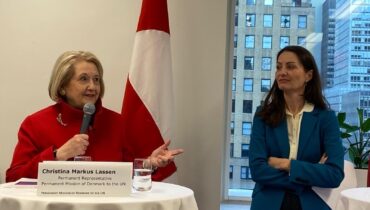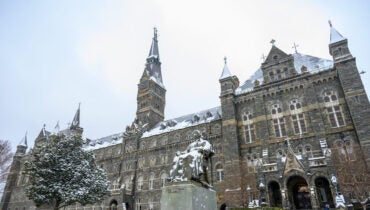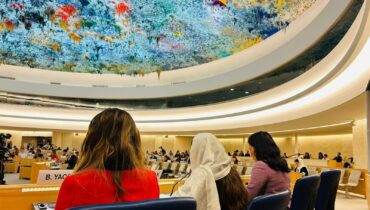WASHINGTON, D.C. | September 10, 2020 – Over 100 global leaders and foreign policy experts emphatically state that peace cannot be made on the backs of Afghan women.
The following statement—signed by 26 former presidents and prime ministers, and 34 foreign ministers including 5 former U.S. Secretaries of State—calls for Afghan women’s full participation in the intra-Afghan peace process to “help obtain the long-term security goals we have been working toward for decades.”
It recommends specific measures for the international community to support Afghan women’s involvement in the peace process, including persuading negotiators to preserve equal rights for all citizens as guaranteed by the constitution; conditioning international aid on the preservation of the rights and liberties currently enjoyed by Afghan citizens, especially women’s rights; and establishing monitoring mechanisms to ensure the maintenance of rights.
The statement calls upon “all relevant national, regional and international actors to pursue a peaceful, stable Afghanistan by ensuring women’s full participation in the peace process. After 40 years of conflict, there may finally be an opportunity for peace. The international community has an obligation to assist with ensuring that the peace forged is durable and this opportunity is not squandered.”
The statement was led by Secretary Madeleine Albright and coordinated by the Georgetown Institute for Women, Peace and Security.
—
An Open Letter from World Leaders Calling for Afghan Women’s Meaningful Participation in the Peace Process
We call upon all relevant national, regional and international actors to pursue a peaceful, stable Afghanistan by ensuring women’s full participation in the peace process. After 40 years of conflict, there may finally be an opportunity for peace. The international community has an obligation to assist with ensuring that the peace forged is durable and this opportunity is not squandered.
As global leaders and foreign policy experts, we have seen clear proof that women’s involvement is key to establishing a lasting and sustainable peace. The substantive involvement of women in peace talks makes agreements more likely to be attained and upheld. We have seen evidence of women’s powerful influence in peace processes in recent times, from Colombia to the Philippines. The direct impact women’s participation has on ensuring stability makes their inclusion an international security issue, which the UN Security Council recognized when it adopted the landmark resolution on Women, Peace and Security (UNSCR 1325) twenty years ago this fall.
In the peace process underway in Afghanistan, the international community should prioritize women’s meaningful inclusion in order to help obtain the long-term security goals we have been working toward for decades. We have already seen enormous progress in Afghanistan since women have begun to be integrated into society as equal citizens. The Taliban banned girls from schooling and today over 3.5 million girls are enrolled. Women went from being virtually erased under Taliban rule to becoming policewomen, teachers, public officials, mayors and entrepreneurs. In 2019, women accounted for 28% of the Afghan parliament – a proportion higher than 67% of countries tracked by the World Bank. They will not surrender these gains. Peace cannot be made on the backs of Afghan women.
Guaranteeing the preservation of equality, democracy, and inclusivity will promote stability and help to protect future generations from the threat of extremism. Afghanistan, the region, and the world would all be safer as a result.
Given the key role of women in ensuring a durable peace, the following measures are necessary:
- Women need to be party to the negotiations, not just an issue to be discussed.
- Women must be involved throughout every step of the process.
- The perspective of women and youth must be reflected in any agreement.
To ensure these goals are met, we call on the international community to do the following:
- Persuade negotiators to preserve equal rights for all its citizens as guaranteed by the Afghan constitution.
- Condition international aid on the preservation of the rights and liberties currently enjoyed by Afghan citizens, especially women’s rights.
- Implement legitimate and established monitoring mechanisms for ensuring the maintenance of rights. Ensure these mechanisms are outlined in the peace agreement and that women are part of the development, implementation and monitoring of such mechanisms.
An oppressive Afghanistan will not be stable, safe or prosperous. In order to honor the sacrifices and investments that have been made over many years, we must prioritize the future role of women in Afghanistan – which starts with their substantive involvement in the peace process.
Signatories
Karen AbuZayd, Commissioner of the UN Inquiry on Syria and Former Commissioner-General of UNRWA
María Elena Agüero, Secretary-General of the Club de Madrid
Shamshad Akhtar, Former UN Under-Secretary-General and Executive Secretary of ESCAP
Sheikh Abdullah bin Zayed Al Nahyan, Minister of Foreign Affairs and International Cooperation of the United Arab Emirates
Madeleine Albright, Former United States Secretary of State
Amat Al Alim Alsoswa, Yemen’s Former Minister for Human Rights, Former UN Assistant Secretary-General and UNDP Assistant Administrator
Valerie Amos, Former UN Under-Secretary-General for Humanitarian Affairs and Emergency Relief Coordinator
Mayu Ávila, Former Minister of Foreign Affairs of El Salvador
Lloyd Axworthy, Former Minister of Foreign Affairs of Canada
Ali Babacan, Former Deputy Prime Minister of Turkey
Jan Peter Balkenende, Former Prime Minister of The Netherlands
Carol Bellamy, Former Executive Director of UNICEF
Mohamed Benaissa, Former Minister of Foreign Affairs of Morocco
Catherine Bertini, Former Executive Director of the UN World Food Program
Carl Bildt, Former Prime Minister of Sweden
Julie Bishop, Former Minister for Foreign Affairs of Australia
Irina Bokova, Former Director-General of UNESCO
Lakhdar Brahimi, Former Minister of Foreign Affairs of Algeria and UN Special Envoy for Afghanistan
Gro Harlem Brundtland, Former Prime Minister of Norway
Laura Bush, Former First Lady of the United States
Kim Campbell, Former Prime Minister of Canada
Margaret Chan, Former Director-General of the World Health Organization
Helen Clark, Former Prime Minister of New Zealand and Administrator of UNDP
Joe Clark, Former Prime Minister of Canada
Sean Cleary, Chief Director of the Office of the Administrator General of Namibia
Hillary Rodham Clinton, Former United States Secretary of State
Kathleen Cravero, Former UNDP Assistant Secretary-General for Conflict Prevention and Recovery
Staffan de Mistura, Former Under Secretary-General and UN Special Envoy to Iraq, Afghanistan, and Syria
Isabel de Saint Malo, Former Vice President of Panama
Erik Derycke, Former Minister of Foreign Affairs of Belgium
Rut Diamint, Chief of Cabinet and Advisor to the Argentine Ministry of Defense
Lamberto Dini, Former Prime Minister of Italy
Paula J. Dobriansky, Former United States Under-Secretary of State for Global Affairs
Alexander Downer, Former Minister for Foreign Affairs of Australia
Mikuláš Dzurinda, Former Prime Minister of Slovakia
Jan Eliasson, Former Deputy Secretary-General of the United Nations and Minister for Foreign Affairs of Sweden
María Fernanda Espinosa, Former Minister of Foreign Affairs and Minister of National Defence of Ecuador
Christiana Figueres, Former Executive Secretary of the UN Framework Convention on Climate Change
Joschka Fischer, Former Minister of Foreign Affairs and Vice Chancellor of Germany
Louise Fréchette, Former Deputy Secretary-General of the United Nations
Robert Gates, Former United States Secretary of Defense
Rose Gottemoeller, Former Deputy Secretary-General of NATO
Dalia Grybauskaitė, Former President of Lithuania
Rebeca Grynspan, Ibero-American Secretary-General and Former Vice President of Costa Rica
Geeta Rao Gupta, Former Deputy Executive Director of UNICEF
Stephen Hadley, Former United States National Security Advisor
Chuck Hagel, Former United States Secretary of Defense
Lord William Hague, Former Foreign Secretary of the United Kingdom
Tarja Halonen, Former President of Finland
Ameerah Haq, Former UN Under-Secretary-General for the Department of Field Support
Stephen J. Harper, Former Prime Minister of Canada
Noeleen Heyzer, Former Under-Secretary-General of the United Nations
Fiona Hodgson, Baroness Hodgson of Abinger
John Howard, Former Prime Minister of Australia
Toomas Hendrik Ilves, Former President of Estonia
Igor Ivanov, Former Foreign Minister of Russia
Atifete Jahjaga , Former President of Kosovo
Angelina Jolie , Special Envoy of the United Nations High Commissioner for Refugees
Medhi Jomaa, Former Prime Minister of Tunisia
Ivo Josipović , Former President of Croatia
Marina Kaljurand, Former Minister of Foreign Affairs of Estonia
John Kerry, Former United States Secretary of State
Rima Khalaf, Former UN Under-Secretary-General and Executive Secretary of ESCWA
Ban Ki-moon, Former Secretary-General of the United Nations
Aleksander Kwaśniewski, Former President of Poland
Rachel Kyte, Former Special Representative of the UN Secretary-General for Sustainable Energy for All
Zlatko Lagumdžija , Former Prime Minister of Bosnia and Herzegovina
Tzipi Livni, Former Foreign Minister, Vice Prime Minister, and Minister of Justice of Israel
Jessie Rose Mabutas, Former Assistant President of the International Fund for Agricultural Development
Peter MacKay, Former Minister of Foreign Affairs and Minister of National Defence of Canada
Susana Malcorra, Former Minister of Foreign Affairs of Argentina
Purnima Mane, Former UN Assistant Secretary-General and Deputy Executive Director of UNFPA
Mara Marinaki, EEAS Principal Adviser on Gender and on the Implementation of UNSCR 1325 on Women, Peace and Security
Cindy McCain, Chair of the McCain Institute Board of Trustees
Sir Donald McKinnon, Former Deputy Prime Minister and Minister of Foreign Affairs of New Zealand
Monica McWilliams, Former Chief Commissioner of the Northern Ireland Human Rights Commission and Signatory to the Northern Ireland Good Friday Peace Agreement
David Miliband, Former Foreign Secretary of the United Kingdom
Laura Chinchilla Miranda, Former President of Costa Rica
Amr Moussa, Former Secretary-General of the Arab League and Minister of Foreign Affairs of Egypt
Marwan al-Muasher, Former Minister for Foreign Affairs and Deputy Prime Minister of Jordan
Roza Otunbayeva, Former President of Kyrgyzstan
Ana Palacio, Former Minister for Foreign Affairs of Spain
Leon Panetta, Former United States Secretary of Defense
George Papandreou, Former Prime Minister of Greece
Colin L. Powell, Former United States Secretary of State and Chairman of the Joint Chiefs
Anders Fogh Rasmussen, Former Prime Minister of Denmark and Secretary-General of NATO
Òscar Ribas Reig, Former Prime Minister of Andorra
Condoleezza Rice, Former United States Secretary of State
Malcolm Rifkind, Former Secretary of State for Scotland, Defence Secretary, and Foreign Secretary of the United Kingdom
Lord George Robertson, Former NATO Secretary General and UK Defense Secretary
Mary Robinson, Former President of Ireland
Fatiha Serour, UN Deputy Special Representative for Somalia
Karin Sham Poo, Former Deputy Executive Director of UNICEF
Natan Sharansky, Former Deputy Prime Minister of Israel and Political Prisoner of the Soviet Union
Ellen Johnson Sirleaf, Former President of Liberia
Gillian Sorensen, Former UN Assistant Secretary-General for External Relations
Cassam Uteem, Former President of Mauritius
Jozias van Aartsen, Former Mayor of Amsterdam and Minister of Foreign Affairs of the Netherlands
Hubert Védrine, Former Minister of Foreign Affairs of France
Ann Veneman, Former Executive Director of UNICEF
Melanne Verveer, Former United States Ambassador-at-Large for Global Women’s Issues
Knut Vollebæk , Former Minister of Foreign Affairs of Norway
Alexandr “Sasha” Vondra, Former Minister of Foreign Affairs and Minister of Defence of the Czech Republic
Margot Wallström, Former Deputy Prime Minister and Minister for Foreign Affairs of Sweden
José Luis Rodríguez Zapatero, Former Prime Minister of Spain
Miomir Žužul, Former Minister for Foreign Affairs of Croatia
Media Contact
Sarah Rutherford
+1 (412) 965 9275
Sarah.rutherford@georgetown.edu


